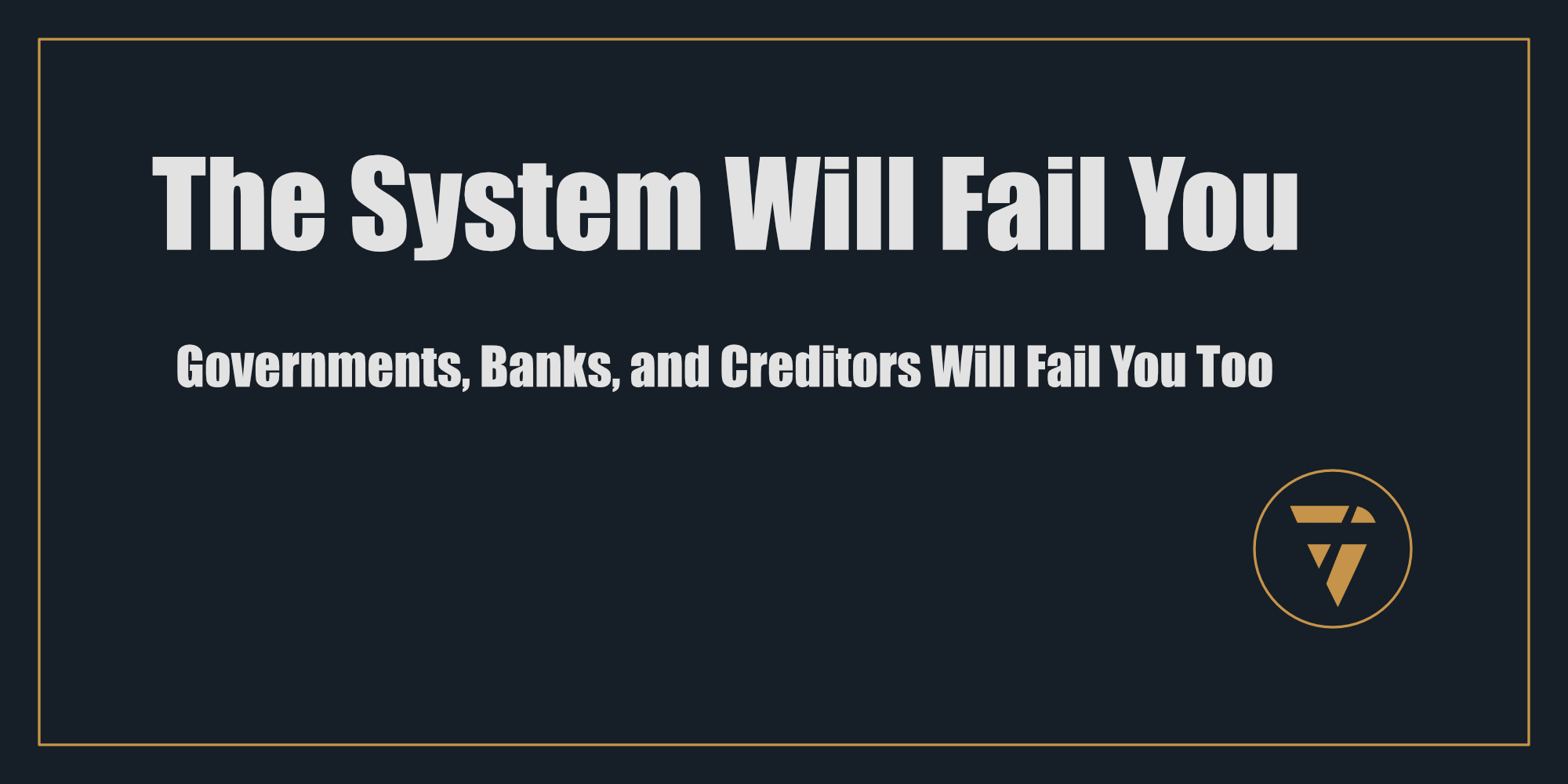The System Will Fail You

Governments, Banks, and Creditors Will Fail You Too
In times of crisis, many business owners assume there will be a lifeline. They expect government support programs, bank assistance, or emergency credit extensions to keep them afloat. They believe that if things get bad enough, someone will step in to stabilize the system.
This is a fatal mistake.
Governments do not exist to save businesses. Banks do not care about your survival. Creditors want their payments, regardless of your financial situation. If history has proven anything, it is that when economies falter, the system protects itself first.
During downturns, governments issue bailout programs that rarely reach the businesses that need them most. Banks tighten lending policies, making credit harder to access. Large corporations receive special treatment while small businesses are left behind. By the time help arrives—if it arrives—it is too late.
The businesses that survive are the ones that never relied on external support in the first place. They secure their own capital, restructure debt before they are desperate, and develop financial contingency plans before they need them.
If you are waiting for the system to save you, you are already losing. The only way forward is complete financial self-sufficiency.
How to Restructure Debt, Secure Capital, and Protect Financial Reserves
Financial mismanagement is one of the primary reasons businesses collapse in a crisis. Many businesses take on debt under the assumption that future revenue will cover it. When revenue disappears, they are left scrambling.
The time to restructure and secure financial stability is before a crisis peaks—not during it. Here’s how.
1. Restructure Debt Before It Becomes a Threat
Debt is not inherently bad, but badly structured debt is a time bomb. In a downturn, businesses with high-interest loans, short repayment timelines, or overleveraged credit positions will collapse first.
- Renegotiate terms now. Contact lenders before you are struggling to request lower interest rates, extended repayment terms, or temporary deferrals.
- Consolidate high-interest debt. Refinancing into lower-interest, long-term loans reduces immediate financial strain.
- Pay off volatile debt first. Lines of credit and short-term loans should be cleared or minimized before long-term obligations.
- Secure emergency credit while you still can. Lenders reduce credit limits and deny applications when businesses need them most. Secure additional credit lines now, even if you do not need them yet.
The worst position to be in is needing to negotiate with banks when you are already in financial distress. Act now while you still have leverage.
2. Build and Protect Financial Reserves
A business with no cash reserves is a business at constant risk. The ideal reserve is three to six months of operating expenses in liquid cash. If that is not possible, start building reserves now—even small amounts can make the difference between survival and collapse.
- Reduce non-essential expenses immediately. The more you cut now, the more cash you can redirect into reserves.
- Convert assets into liquid capital. Inventory, equipment, and real estate can be leveraged or sold to increase cash reserves.
- Move cash into multiple banking institutions. Do not rely on a single bank. If restrictions or freezes occur, having reserves in multiple places prevents full loss of access.
Businesses with reserves are not forced into desperate financial decisions when the economy turns.
Alternative Funding Strategies for Crisis Economies
When traditional funding sources dry up, businesses must explore alternative financing options to maintain cash flow.
1. Revenue-Based Financing
Instead of taking on traditional loans, revenue-based financing allows businesses to secure capital in exchange for a percentage of future revenue. This model prevents fixed monthly debt payments that become burdensome during slow periods.
2. Crowdfunding and Community Capital
Many businesses assume crowdfunding is only for startups, but in crisis economies, leveraging community support can provide essential funding.
- Pre-sell products or services to raise immediate cash.
- Launch a membership or subscription model to create reliable cash flow from loyal customers.
- Offer investment opportunities to existing customers. Many loyal clients would rather contribute to keeping a trusted business afloat than see it fail.
3. Private Lending and Strategic Investment
Banks may deny loans in uncertain economies, but private investors, venture capital groups, and peer-to-peer lending networks remain active.
- Seek investment from industry partners, suppliers, or customers.
- Explore peer-to-peer lending platforms that bypass traditional banks.
- Form profit-sharing agreements instead of taking on interest-heavy debt.
Businesses that look beyond traditional funding sources will have more options when capital becomes scarce.
The Trap of Government Aid—What They Don’t Tell You
Government aid programs are often portrayed as a solution for struggling businesses, but they come with serious risks.
1. Delayed or Denied Funding
Many businesses apply for relief programs only to wait months for funds that never arrive. By the time assistance is approved, the damage is already done.
2. Debt Disguised as Aid
Many government assistance programs are structured as loans, not grants. Businesses that accept them without reading the fine print often find themselves burdened with new debt that becomes unsustainable.
3. Restrictive Conditions and Compliance Risks
Government relief often comes with conditions that limit how funds can be used. Businesses may also be required to meet reporting and compliance standards that create additional operational burdens.
Instead of relying on government aid, build financial resilience through independent funding and internal cash reserves.
A "Financial Contingency Map" to Keep Your Business Solvent
A Financial Contingency Map ensures that if your primary funding sources disappear, your business can still operate. This structured plan outlines exactly how to maintain cash flow and financial stability under worst-case conditions.
Step 1: Identify Financial Vulnerabilities
- List every financial obligation—rent, payroll, debt payments, supplier costs.
- Identify expenses that can be reduced, renegotiated, or eliminated.
- Determine how long current reserves can sustain operations.
Step 2: Secure Immediate Cash Flow Stability
- Collect outstanding payments from clients now. Offer early payment incentives.
- Sell non-essential assets to increase cash reserves.
- Reduce or eliminate discretionary spending.
Step 3: Create Emergency Funding Access
- Establish alternative financing sources—private lending, revenue-based financing, or crowdfunding.
- Open additional business bank accounts to diversify cash access.
- Secure additional credit before it is needed.
Step 4: Develop a Worst-Case Survival Plan
- Identify the minimum revenue needed to keep essential operations running.
- Create an extreme cost-reduction plan if revenue drops significantly.
- Establish contingency supplier agreements to maintain access to critical resources.
A Financial Contingency Map ensures that even in the worst conditions, your business can continue operating without relying on external help.
The Businesses That Survive Take Control—The Rest Get Left Behind
Waiting for someone to save you is not a financial strategy. The businesses that will survive and grow through economic downturns are the ones that have already secured their financial independence.
Banks will restrict lending, governments will delay aid, and creditors will demand payments regardless of your situation. If you are not prepared now, you will have no options when the crisis deepens.
Your financial future is in your hands. The only question is whether you will take control before it's too late.
This is what I’m working on. Tell me what you think, I enjoy the conversation! Subscribe and follow the work in real time.
Thanks!
B

No one is coming to save your business.
Banks will tighten credit. Governments will delay aid. Creditors will demand payment, no matter the crisis.
If you don’t secure cash flow, restructure debt, and build reserves now, you won’t survive.
Financial self-sufficiency isn’t optional—it’s survival.
PS -






